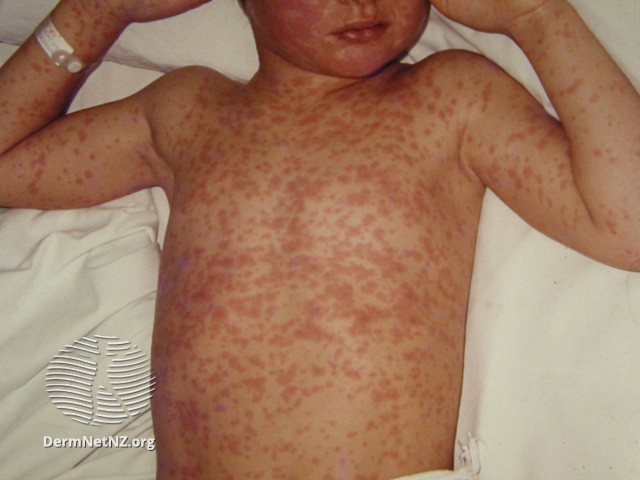Measles
Measles is an infection that spreads very easily. It's unpleasant and can sometimes have serious complications. Having the measles,mumps and rubella (MMR) vaccine is the best way to prevent it.
Anyone can get measles if they haven't been vaccinated or they haven't had it before. It's most common in young children.
Measles usually clears in around 7 to 10 days. Please visit NHS choices for more advice and guidance on measles.
Symptoms of measles
The first symptoms of measles develop around 10 days after you're infected. These can include:
- cold-like symptoms, such as a runny nose, sneezing, and a cough
- sore, red eyes that may be sensitive to light
- watery eyes
- swollen eyes
- a high temperature (fever), which may reach around 40°C (104°F)
- small greyish-white spots in the mouth
- aches and pains
- loss of appetite
- tiredness, irritability and a general lack of energy
The measles rash appears around 2 to 4 days after the initial symptoms and normally fades after about a week. The rash:
- is made up of small red-brown, flat or slightly raised spots that may join together into larger blotchy patches
- usually first appears on the head or neck, before spreading outwards to the rest of the body
- is slightly itchy for some people
When you should worry?
If you or your child have measles and:
- shortness of breath
- a high temperature that does not come down after taking paracetamol or ibuprofen
- is coughing up blood
- drowsiness
- confusion
- fits (convulsions)
You need urgent help.
Go to the nearest Hospital Emergency (A&E) Department or phone 999
If you think you or your child might have measles:
- you've been in close contact with someone who has measles and you've not been fully vaccinated (had 2 doses of the MMR vaccine) or haven't had the infection before – even if you don't have any symptoms
- if children/child <2 year old, should contact their doctor
- You or your child are peeing less than usual (or your baby has fewer wet nappies)
- Your baby or young child is not feeding well, or taking less feeds or fluids than usual
- you've been in close contact with someone who has measles and you're pregnant – measles can be serious in pregnancy
- you have a weakened immune system and think you have measles or have been in close contact with someone with measles i.e. Significant contact means being in the same room for 15 minutes or more, or face-to-face contact. In immunosuppressed individuals, however, any level of contact is assumed to be significant.
You need to contact a doctor or nurse today.
Please ring your GP surgery or call NHS 111 - dial 111
Let them know you suspect Measles before attending.
Self-care - treatment for measles
There are things you can do to help relieve your symptoms:
- take paracetamol or ibuprofen to relieve fever, aches and pains – aspirin should not be given to children under 16 years old
- drink plenty of water to avoid dehydration
- use damp cotton wool to clean the eyes
Self care
Continue providing your child’s care at home. If you are still concerned about your child, call NHS 111 – dial 111
Is measles serious?
Measles can be unpleasant but will usually pass in about 7 to 10 days without causing any further problems. Once you've had measles, your body builds up resistance (immunity) to the virus. It's highly unlikely you'll get it again. However, measles can lead to serious and potentially life-threatening complications in some people. These include infections of the lungs (pneumonia) and brain (encephalitis).
How measles is spread
The measles virus is contained in tiny droplets that come out of the nose and mouth when an infected person coughs or sneezes. You can easily catch measles by breathing in these droplets. Or, if the droplets have settled on a surface, by touching the surface and then placing your hands near your nose or mouth. The virus can survive on surfaces for a few hours. People with measles are infectious from when the symptoms develop until about 4 days after the rash first appears.
How to prevent spreading measles to others
If you have measles:
- stay off school or work for at least 4 days from when the rash first appears
- regularly wash your hands with soap
- use and dispose of tissues when you sneeze
- avoid close contact with anyone who isn't fully vaccinated
How measles can be prevented
- Measles can be prevented by having the MMR vaccine.
- This is given in 2 doses as part of the NHS childhood vaccination programme.
- You can be vaccinated at any age if you haven't been fully vaccinated before.
If the MMR vaccine isn't suitable for you, a treatment called human normal immunoglobulin (HNIG) can be used if you're at immediate risk of catching measles.
For wear and tear, minor trips and everything in between.
Self-care
You can treat your child's very minor illnesses and injuries at home.
Some illnesses can be treated in your own home with support and advice from the services listed when required, using the recommended medicines and getting plenty of rest.
Sound advice
Children can recover from illness quickly but also can become more poorly quickly; it is important to seek further advice if a child's condition gets worse.
For information on common childhood illnesses go to What is wrong with my child?
Pharmacists are experts in many aspects of healthcare and can offer advice on a wide range of long-term conditions and common illnesses such as coughs, colds and stomach upsets. You don’t need an appointment and many have private consultation areas, so they are a good first port of call. Your pharmacist will say if you need further medical attention.
Sound advice
- Visit a pharmacy if your child is ill, but does not need to see a GP.
- Remember that if your child's condition gets worse, you should seek further medical advice immediately.
- Help your child to understand - watch this video with them about going to the pharmacy.
For information on common childhood illnesses go to What is wrong with my child?
Health visitors are nurses or midwives who are passionate about promoting healthy lifestyles and preventing illness through the delivery of the Healthy Child Programme. They work with you through your pregnancy up until your child is ready to start school.
Health Visitors can also make referrals for you to other health professionals for example hearing or vision concerns or to the Community Paediatricians or to the child and adolescent mental health services.
Contact them by phoning your Health Visitor Team or local Children’s Centre.
Sound advice
Health visitors also provide advice, support and guidance in caring for your child, including:
- Breastfeeding, weaning and healthy eating
- Exercise, hygiene and safety
- Your child’s growth and development
- Emotional health and wellbeing, including postnatal depression
- Safety in the home
- Stopping smoking
- Contraception and sexual health
- Sleep and behaviour management (including temper tantrums!)
- Toilet training
- Minor illnesses
For more information watch the video: What does a health visitor do?
School nurses care for children and young people, aged 5-19, and their families, to ensure their health needs are supported within their school and community. They work closely with education staff and other agencies to support parents, carers and the children and young people, with physical and/or emotional health needs.
Contacting the School Nurse
Primary and secondary schools have an allocated school nurse – telephone your child’s school to ask for the contact details of your named school nurse.
There is also a specialist nurse who works with families who choose to educate their children at home.
Sound Advice
Before your child starts school your health visitor will meet with the school nursing team to transfer their care to the school nursing service. The school nursing team consists of a school nursing lead, specialist public health practitioners and school health staff nurses.
They all have a role in preventing disease and promoting health and wellbeing, by:-
- encouraging healthier lifestyles
- offering immunisations
- giving information, advice and support to children, young people and their families
- supporting children with complex health needs
Each member of the team has links with many other professionals who also work with children including community paediatricians, child and adolescent mental health teams, health visitors and speech and language therapists. The school health nursing service also forms part of the multi-agency services for children, young people and families where there are child protection or safeguarding issues.
GPs assess, treat and manage a whole range of health problems. They also provide health education, give vaccinations and carry out simple surgical procedures. Your GP will arrange a referral to a hospital specialist should you need it.
Sound advice
You have a choice of service:
- Doctors/GPs can treat many illnesses that do not warrant a visit to A&E.
- Help your child to understand – watch this video with them about visiting the GP or going to a walk in centre
For information on common childhood illnesses go to What is wrong with my child?
If you’re not sure which NHS service you need, call 111. An adviser will ask you questions to assess your symptoms and then give you the advice you need, or direct you straightaway to the best service for you in your area.
Sound advice
Use NHS 111 if you are unsure what to do next, have any questions about a condition or treatment or require information about local health services.
For information on common childhood illnesses go to What is wrong with my child?
A&E departments provide vital care for life-threatening emergencies, such as loss of consciousness, suspected heart attacks, breathing difficulties, or severe bleeding that cannot be stopped. If you’re not sure it’s an emergency, call 111 for advice.



